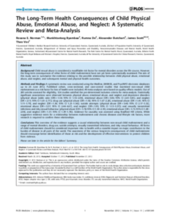This study conducted a systematic review and meta-analysis of scientific literature to summarize the evidence for associations between individual types of non-sexual child maltreatment and outcomes related to mental and physical health. This review is a first of its kind to demonstrate in aggregate quantitative effects the knowledge behind the associations, using 124 studies mostly from Western Europe, North America, Australia, and New Zealand. Eighty percent of child maltreatment is perpetrated by parents or parental guardians, and poverty, mental health problems, low educational achievement, alcohol and drug misuse, having been maltreated oneself as a child, and family breakdown or violence between other family members have all been shown to be important risk factors for parents abusing their children.
Statistically significant associations were observed between physical abuse, emotional abuse, and neglect and depressive disorders, drug use, suicide attempt, and sexually transmitted infections, and risky sexual behavior. Physical abuse and neglect were also associated with a doubling of the odds of childhood behavioural and conduct disorders. There is also emerging evidence that neglect in childhood may be as harmful as physical and emotional abuse. The authors review the evidence on some of the possible mechanisms that may explain these observed associations, including the fact that neurobiological development can be physiologically altered by maltreatment during a child’s early years, which can in turn negatively affect a child’s physical, cognitive, emotional, and social growth, leading to psychological, behavioural, and learning problems that persist throughout the life course. More over, cumulative trauma may further increase risk, and some victims of abuse may try to manage the subsequent distress through the use of alcohol, prescription medication, tobacco, or other drugs. The authors discuss the implications of their findings and recommend that all forms of child maltreatment should be considered important risks to health with a sizeable impact on major contributors to the burden of disease in all parts of the world. The awareness of the serious long-term consequences of child maltreatment should encourage better identification of those at risk and the development of effective interventions to protect children from violence. They suggest that evidence-based systemic interventions that improve parenting strategies and family functioning may be more effective and economical than attempting to treat the wide-ranging deleterious health outcomes in adulthood that arise from maltreatment in the early years of life.
This article is available on open access from Plos Medicine. For further information see: http://www.plosmedicine.org/article/info%3Adoi%2F10.1371%2Fjournal.pmed.1001349
©PLoS Med

